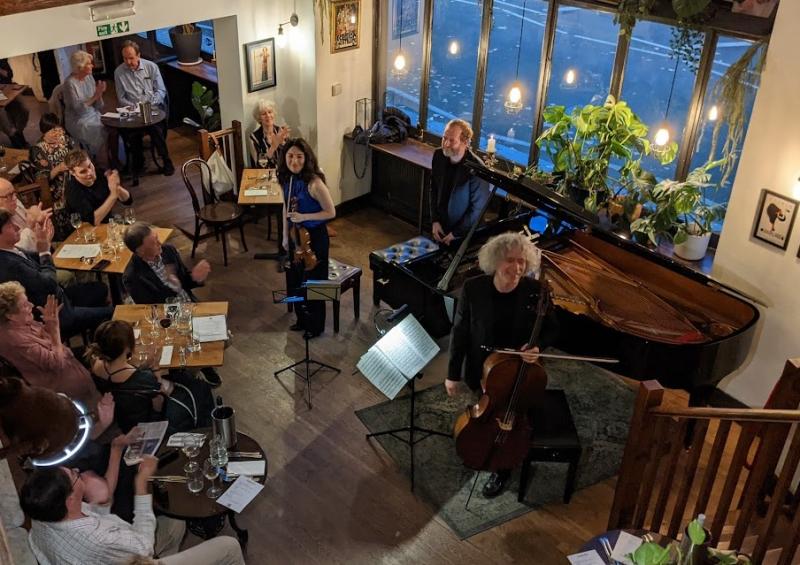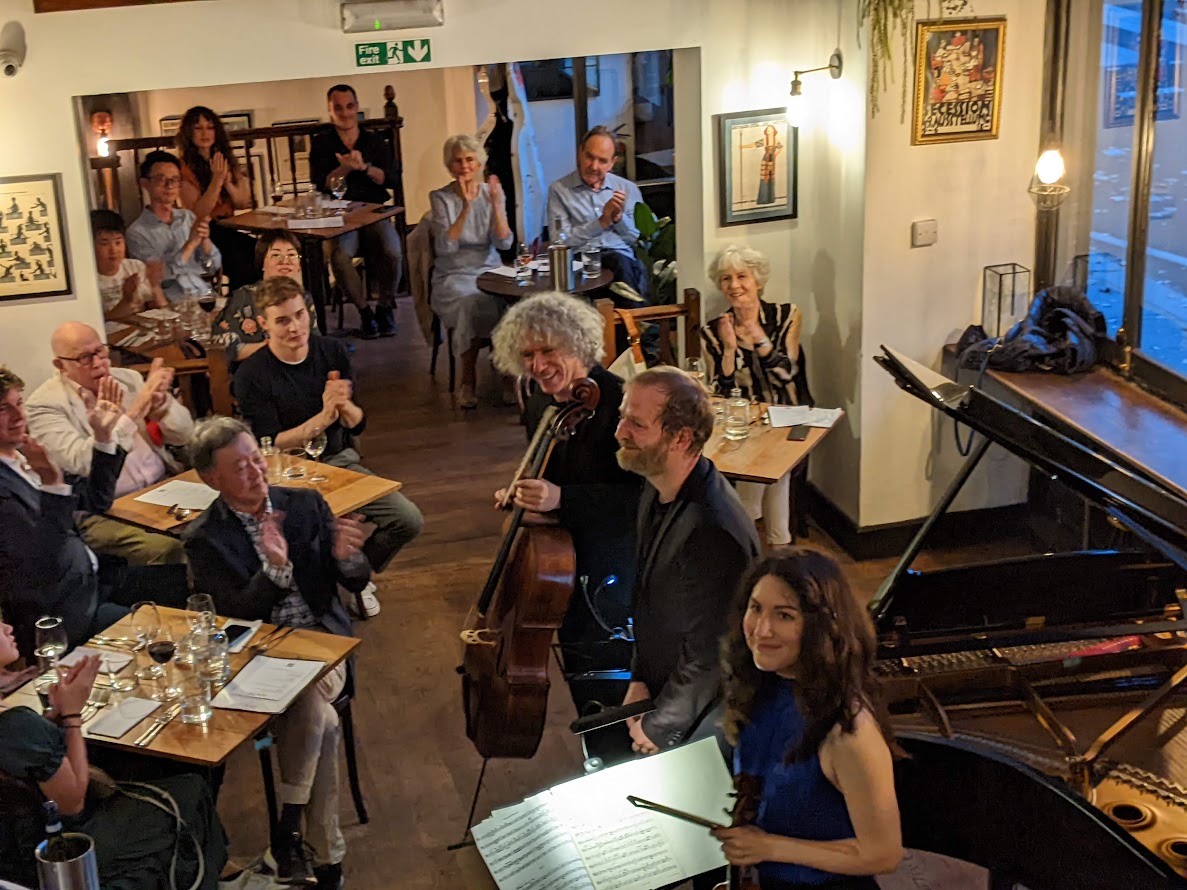Duval, Isserlis, Beatson, Fidelio Cafe review - in seventh heaven with the greats | reviews, news & interviews
Duval, Isserlis, Beatson, Fidelio Cafe review - in seventh heaven with the greats
Duval, Isserlis, Beatson, Fidelio Cafe review - in seventh heaven with the greats
Hyper-communicative Lalo, Ravel, Fauré and Schumann from the best

It feels like a decade, but only two and a bit years have passed since Steven Isserlis stepped out in front of a small but very much live audience at what was then the Fidelio Orchestra Cafe in July 2020. Three hundred or so Fidelio events later, he’s back, and much as he clearly loves the place, he loves the French repertoire he’s been playing with violinist Irène Duval and pianist Alasdair Beatson even more.
I’m with Isserlis on Ravel’s Sonata for Violin and Cello being the greatest masterpiece ever composed for that combination – I’d go even further and say for any meeting of two stringed instruments. And I doubt if anyone was going to deny his massive claims for Fauré’s late Piano Trio after the equally rapturous performance.
First, though, in the first of his always entertaining introductions, three hates had to be cited – liver, bad reviews and learning new pieces. One he’d just mastered with Beatson was Lalo’s early (1856) Cello Sonata, and there were positives here not only for the work itself – he prefers it to the concertos, not sure I’d go that far – but also for the extraordinary online library of works out of copyright, IMSLP Petrucci (it’s free to use, but I recommend a donation to keep it going). Cellist and pianist had found the metronome marking for the central movement absurdly slow, but found an edition on Petrucci giving an indication which made it two or three times faster, so we could set to our meals after the concert much sooner.  Many of the themes, however gilded here, sounded generic for their time, but Lalo can’t resist a rather French quirk of letting the piano lighten the finale’s rodomantade with an intermezzo-like charmer; Beatson handled it deliciously. And the finesse of the finishes in the first two movements was very much an Isserlis hallmark.
Many of the themes, however gilded here, sounded generic for their time, but Lalo can’t resist a rather French quirk of letting the piano lighten the finale’s rodomantade with an intermezzo-like charmer; Beatson handled it deliciously. And the finesse of the finishes in the first two movements was very much an Isserlis hallmark.
How much more of an impact they have in the first and third movements of Ravel’s genius duo sonata. From the start, with the cello meshing on the high wire with the violin, this was a riveting performance. I first encountered Duval earlier this year in a concert for Ukraine conducted by the Estonian Andres Kaljuste. She made very charming work of Mozart’s A major Violin Concerto, while Isserlis – who would have been in Odesa on the night of the fundraiser – brought extraordinary inwardness to Haydn’s C major Cello Concerto. This was the first time I’ve heard them play together, and it’s the highest compliment that Duval could sometimes draw focus from the most charismatic of cellists. The “vif” (lively) movements were on the right, fantastical kind of edge, while the “Lent” scoured the soul before retreating to its original memorial tone.
Fauré’s slow movement in his D minor Piano Trio, an astonishing, in-love-with-the-world feat from the outwardly frail end of his life, goes even further. As the violin and cello unisons grew ever more ecstatic, Isserlis seemed to be in another world, and then we were there too, without knowing how it had happened. The elusive harmonic journeys which make the composer unique among the late-romantics were effortlessly charted by Beatson; the uplift at the end was total. And then we had the perfect “good night” of an encore from, as Isserlis put it, the only German composer who could follow these French masters – Schumann’s “Duett” from his Op, 88 Fantasiestücke. All this, and the unbelievable good fortune of being a couple of metres away from these remarkable artists,, along with others in a star-studded audience: that’s the magic of the Fidelio Cafe
rating
Explore topics
Share this article
The future of Arts Journalism
You can stop theartsdesk.com closing!
We urgently need financing to survive. Our fundraising drive has thus far raised £49,000 but we need to reach £100,000 or we will be forced to close. Please contribute here: https://gofund.me/c3f6033d
And if you can forward this information to anyone who might assist, we’d be grateful.

Subscribe to theartsdesk.com
Thank you for continuing to read our work on theartsdesk.com. For unlimited access to every article in its entirety, including our archive of more than 15,000 pieces, we're asking for £5 per month or £40 per year. We feel it's a very good deal, and hope you do too.
To take a subscription now simply click here.
And if you're looking for that extra gift for a friend or family member, why not treat them to a theartsdesk.com gift subscription?
more Classical music
 Anja Mittermüller, Richard Fu, Wigmore Hall review - a glorious hall debut
The Austrian mezzo shines - at the age of 22
Anja Mittermüller, Richard Fu, Wigmore Hall review - a glorious hall debut
The Austrian mezzo shines - at the age of 22
 First Person: clarinettist Oliver Pashley on the new horizons of The Hermes Experiment's latest album
Compositions by members of this unusual quartet feature for the first time
First Person: clarinettist Oliver Pashley on the new horizons of The Hermes Experiment's latest album
Compositions by members of this unusual quartet feature for the first time
 Gesualdo Passione, Les Arts Florissants, Amala Dior Company, Barbican review - inspired collaboration excavates the music's humanity
At times it was like watching an anarchic religious procession
Gesualdo Passione, Les Arts Florissants, Amala Dior Company, Barbican review - inspired collaboration excavates the music's humanity
At times it was like watching an anarchic religious procession
 Classical CDs: Camels, concrete and cabaret
An influential American composer's 90th birthday box, plus British piano concertos and a father-and-son duo
Classical CDs: Camels, concrete and cabaret
An influential American composer's 90th birthday box, plus British piano concertos and a father-and-son duo
 Cockerham, Manchester Camerata, Sheen, Martin Harris Centre, Manchester review - re-enacting the dawn of modernism
Two UK premieres added to three miniatures from a seminal event of January 1914
Cockerham, Manchester Camerata, Sheen, Martin Harris Centre, Manchester review - re-enacting the dawn of modernism
Two UK premieres added to three miniatures from a seminal event of January 1914
 Kempf, Brno Philharmonic, Davies, Bridgewater Hall, Manchester review - European tradition meets American jazz
Bouncing Czechs enjoy their Gershwin and Brubeck alongside Janáček and Dvořák
Kempf, Brno Philharmonic, Davies, Bridgewater Hall, Manchester review - European tradition meets American jazz
Bouncing Czechs enjoy their Gershwin and Brubeck alongside Janáček and Dvořák
 Solomon, OAE, Butt, QEH review - daft Biblical whitewashing with great choruses
Even a top soprano and mezzo can’t make this Handel paean wholly convincing
Solomon, OAE, Butt, QEH review - daft Biblical whitewashing with great choruses
Even a top soprano and mezzo can’t make this Handel paean wholly convincing
 Two-Piano Gala, Kings Place review - shining constellations
London Piano Festival curators and illustrious friends entertain and enlighten
Two-Piano Gala, Kings Place review - shining constellations
London Piano Festival curators and illustrious friends entertain and enlighten
 Echo Vocal Ensemble, Latto, Union Chapel review - eclectic choral programme garlanded with dance
Beautiful singing at the heart of an imaginative and stylistically varied concert
Echo Vocal Ensemble, Latto, Union Chapel review - eclectic choral programme garlanded with dance
Beautiful singing at the heart of an imaginative and stylistically varied concert
 Scott, Irish Baroque Orchestra, Whelan, RIAM, Dublin review - towards a Mozart masterpiece
Characteristic joy and enlightenment from this team, but a valveless horn brings problems
Scott, Irish Baroque Orchestra, Whelan, RIAM, Dublin review - towards a Mozart masterpiece
Characteristic joy and enlightenment from this team, but a valveless horn brings problems
 Classical CDs: Voice flutes, flugelhorns and froth
Baroque sonatas, English orchestral music and an emotionally-charged vocal recital
Classical CDs: Voice flutes, flugelhorns and froth
Baroque sonatas, English orchestral music and an emotionally-charged vocal recital

Add comment